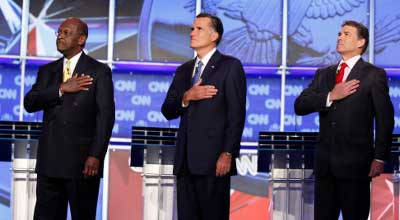Study Explores Religion’s Impact on Romney, Perry, Cain Campaigns
Despite heavy media coverage of Mitt Romney’s religion, only 42 percent of Americans correctly identify the candidate as a Mormon. This level of knowledge remains the same from July, even after Texas pastor Robert Jeffress’ comments about Mormonism being a cult spread like wildfire and sparked a heated debate.
Indeed, a new survey from the Public Religion Research Institute finds that white evangelical Protestants are the only subgroup that demonstrates increased knowledge of Romney’s religion (53 percent today compared to 44 percent in July). The Religion & Politics Tracking Survey also finds that registered voters are more likely than Americans overall to correctly identify Romney’s religion (49 percent, compared to 42 percent respectively).
“The increase in knowledge of Romney’s Mormon faith among evangelicals is potentially problematic for Romney, since we know from our research that six-in-10 evangelicals do not see the Mormon faith to be a Christian religion,” said Daniel Cox, PRRI Research Director. “As more evangelical voters identify Romney as a Mormon, the question will be whether he can bridge the religious gap with shared political values.”
The survey also reveals why businessman Herman Cain found an opening in the Republican primary field.
“The sources of Cain’s strength are Romney and Perry’s weaknesses,” said Dr. Robert P. Jones, CEO of Public Religion Research Institute. “Especially for the GOP primary, where white evangelical Protestants play a prominent role, candidates need to connect with voters on both shared political and religious values.
“Romney is strong on political affinity, but weaker on religious affinity. Perry is weaker on political affinity but stronger on religious affinity. Cain is strong on both political and religious affinity among evangelical voters.”
The two groups most likely to identify Romney as Mormon are college graduates (66 percent) and seniors ages 65 and up (62 percent).
Republicans (52 percent) and members of the Tea Party movement (52 percent) are significantly more likely to correctly identify Romney’s religion than Independents (41 percent) and Democrats (36 percent).
Republican and white evangelical Protestant voters are more than twice as likely to identify with his political views than with his religious views.
Although more than one-quarter (26 percent) of Republican voters say that Romney is the Republican presidential candidate whose political views are closest to their own, only 10 percent of Republican voters report that Romney is the candidate whose religious beliefs are closest to their own.
This same pattern is evident among white evangelical Protestant voters. Twenty-one percent say that Romney is the candidate whose political views are closest to their own, but less than only 8 percent say that, compared to other GOP presidential candidates, Romney’s religious beliefs are closest to their own.
Significant numbers of Republican and white evangelical Protestant voters identify with Cain’s political views and his religious views.
One-quarter (25 percent) of Republican voters say that Cain is the Republican presidential candidate whose political views are closest to their own, compared to about one-in-five (19 percent) Republican voters who say his religious beliefs are closest to their own.
This pattern is similar among white evangelical Protestant voters. More than one-quarter (26 percent) of white evangelical voters say that, compared to other candidates, Cain’s political views are closest to their own, and about one-in-five (20 percent) say his religious beliefs are closest to their own.
Among Republican and white evangelical Protestant voters, Perry trails both Romney and Cain on measures of political affinity, and is roughly even with Cain on measures of religious affinity.
Nearly equal numbers of Republican voters say that Perry’s political views (15 percent) and religious beliefs (17 percent) are closest to their own.
By contrast, white evangelical voters are nearly twice as likely to say Perry’s religious beliefs are closest to their own (22 percent) than to say his political views are closest to their own (12 percent).
Public Religion Research Institute is a nonprofit, nonpartisan research and education organization dedicated to work at the intersection of religion, values and public life.














































